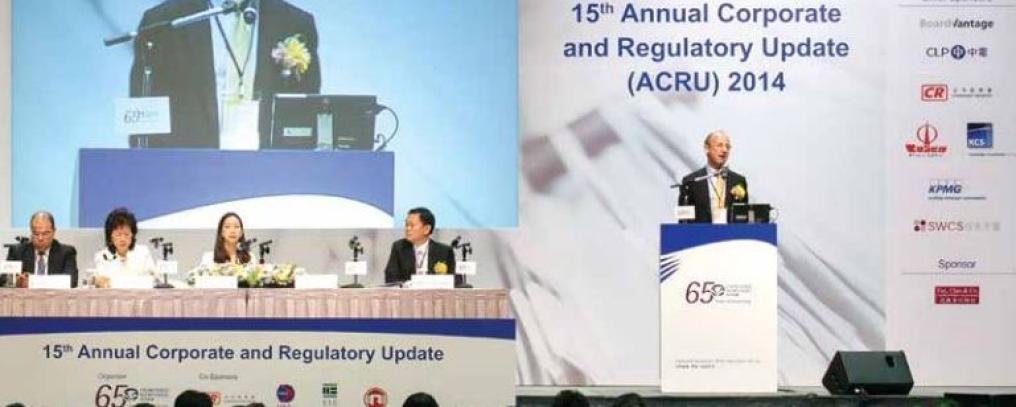This second article in our series on the Hong Kong Institute of Chartered Secretaries gives an introduction to the work of the Institute in the critical areas of professional standards, research and advocacy.
What is the purpose of a professional body? Perhaps the best known function of professional bodies is
their role in awarding professional qualifications, but, once members have qualified, there remains their ongoing role in maintaining professional standards.
‘The professions are built on trust’, says George Beaton, Associate Professor at the University of Melbourne, in his January 2010 essay 'Why professionalism is still relevant' (see: http://www.professions. com.au/Files/Professionalism_Beaton. pdf). 'The doctor or the lawyer is trusted to do the best he or she possibly can for a good outcome, even if some patients are not cured and if some cases are lost. Trust remains because of a basic faith in the disinterestedness and selflessness that is instinctively sensed as the essence of professionalism.’
Trust is especially important in today's business environment where a damaging reputation due to unethical conduct by professionals can go viral via the internet in a matter of minutes.
1. Professional standards
The Hong Kong Institute of Chartered Secretaries (HKICS) takes this aspect of its role very seriously. In October 2013, the Institute revised The Essential Company Secretary (which functions as a mandatory code of conduct for HKICS members) placing greater emphasis on the need for members to actively promote good corporate governance practices and discharge their duties with a high degree of integrity. The guide points out that the reputation, both of the profession and the HKICS, 'stands and falls on the individual and collective efforts of its members in performing their duties with integrity, skill and dedication’.
Professional standards start, of course, with the quality of the education and training students receive on their way into the profession. Both routes into the HKICS – the International Qualifying Scheme (IQS) and the approved collaborative courses with local universities – are subject to a rigorous quality assurance process. The Institute of Chartered Secretaries and Administrators (ICSA) Professional Standards Committee regularly comes to Hong Kong to ensure that the Institute's qualification process is up to the international standard.
The Institute's work in pre-qualification education will be covered in the next article in this series; this article will focus on the equally important post- qualification training – continuing professional development (CPD).
CPD in Hong Kong
The Institute launched its mandatory CPD programme in August 2011 to set a minimum standard for CPD attendance. HKICS members are now required to accumulate at least 15 CPD points annually. Reinforcing the message of the importance of CPD for company secretaries, the listing rules were revised in 2012 to introduce a new rule (rule 3.29) which matches the Institute's new CPD requirements.
‘Maintaining professional standards is crucial in view of the expectations of stakeholders,’ says Jack Chow FCIS FCS, Chairman of the Institute's Professional Development Committee. 'Our Institute has to be the market leader of corporate governance practices. Our CPD programme informs members about corporate governance developments and, at the same time, provides recognition for relevant members’ knowledge.’
He adds that the Institute plans to expand the current mandatory CPD programme to include graduates. 'Graduates, like members, are working and therefore require CPD in order to maintain their knowledge and skills. The extension of mandatory CPD to graduates also enables them to make a steady transition to becoming members.’
Lydia Kan ACIS ACS, the Institute's Director of Professional Development, leads a team of four tasked with running the HKICS CPD programme. She explains that the Institute's mandatory CPD programme is being implemented in four stages starting with the most recent recruits to the profession and extending to all HKICS members by 2017. This phased implementation has now reached its second stage with 2,500 members currently subject to the mandatory requirements.
Ms Kan says that mandatory CPD has been well received by HKICS members – the compliance rate has been 98% since its implementation in 2011. 'Members have also commented positively about the quality and variety of seminars organised by the Institute,’ she adds. Attendance at the Institute's CPD events has significantly increased over the last two years. Attendance was up 36% in 2012/ 2013 over the previous year and the last two Annual Corporate and Regulatory Update (ACRU) seminars have attracted record numbers of attendees – over 1,400 attendees in both years, which is roughly double the number of attendees in previous years.
The mandatory CPD programme is designed to allow flexibility in terms of where members can get their CPD training, but, to ensure the relevance of the training, some of the required 15 CPD points must be earned from the Institute's own Enhanced Continuing Professional Development programme. From 1 August 2014 onwards, members outside the corporate secretarial sector must gain at least three points from the ECPD programme.
This programme covers a broad range of subject matter relevant to the work and skill sets of Institute members and enables members in the corporate secretarial sector to ensure that their specialist knowledge is up to date. Such members are expected to gain a minimum of 15 points from the Institute's ECPD programme annually. With these points, if they have the appropriate experience, members can apply for accreditation from the Institute in the form of the 'Practitioner's Endorsement'.
HKICS members self-declare their CPD compliance annually and the Institute carries out checks on a random 10% sample. Members not fulfilling the mandatory requirements are referred to the Investigation Group under the Institute's Membership Committee. The Investigation Group studies each case and may refer cases to the Disciplinary Tribunal for further action. There has been an increase in the number of cases referred to the Disciplinary Tribunal since the implementation of mandatory CPD and the first sanctions were applied this year. Two members have been publicly sanctioned via this journal for non-compliance with the requirements. In addition to such reprimands, the Disciplinary Tribunal can impose fines and revoke membership.
CPD in Mainland China
As mentioned in the first article in this series, the Institute has been highly active in professional development training in Mainland China. The topics and directions of the CPD events on the Mainland have to be passed through the Professional Development Committee for approval. 'As the Professional Development Committee secretary, I have a coordinating role,’ says Ms Kan. She adds that her team also organises training events in Hong Kong for the Institute's Affiliated Persons from the Mainland and their colleagues. Just like in Hong Kong, attendance at the Institute's Mainland CPD events has been on an upward trend over the past years. 'The demand for training in the Mainland, particularly regarding corporate governance, compliance and board secretarial practice, is high and the Institute is playing an important role in contributing to good corporate governance awareness in the Mainland,’ Ms Kan says.
Ms Kan, who is an Associate of ICSA and HKICS, says she feels proud to be working in this area. 'The company secretarial profession is playing an extremely important role in keeping companies aware of good governance and compliance standards,’ she says. 'But this means that company secretaries need to keep up to date with the changes in rules and regulations in many different areas, both industry specific and generally, such as the listing rules, the Securities and Futures Ordinance, the new Companies Ordinance and the new data privacy, AML and competition regulations. Our CPD requirements have been well received by regulators and employers as a basic means to benchmark professional quality.’
2. Research and advocacy
The HKICS has gained recognition, both in Hong Kong and globally, as a thought leader in the corporate secretarial and corporate governance fields. This reputation has largely come from its research and advocacy initiatives. ‘Research and advocacy are part of the core competency of the HKICS,’ says Mohan Datwani, the Institute's Director of Technical and Research. 'It contributes to the technical knowledge of members; it promotes our brand to regulators; it provides an opportunity for us to work with others; and our work products are increasingly finding their way to board members and other employers.’Consultation submissions
The Institute has played, and continues to play, an integral role in the development of regulatory policy in Hong Kong. Company secretaries, particularly senior members of the profession, have valuable experience to share with regulators and other stakeholders when legislative or regulatory reforms are under consultation. Mr Datwani coordinates the Institute's responses to consultations and he explains that the approach adopted depends on the nature of the consultation. ‘If it is of a technical nature, for example relating to accounting standards, then I will source members with the appropriate skill sets and collate their views. If the consultation is appropriate for a wider audience, then I will consult the appropriate panel. In this regard, I am most grateful to Edith Shih FCIS FCS(PE), April Chan FCIS FCS(PE) and Paul Moyes FCIS FCS, as panel chairs for the Company Secretaries Panel, the Technical Consultation Panel and the Professional Services Panel respectively, and the members of these panels. But there are certain topics, such as the new Companies Ordinance, where we seek views from all members through our CPD programme, CSj and other focus groups and forums,’ Mr Datwani says.Publications and events
The Institute issues a wide variety of publications from practical guides addressing technical areas of company secretarial practice to research reports looking at major issues which will have an impact on the work of practitioners in Hong Kong. The Institute has recently published guides on competition law, directors’ induction and inside information disclosure for A+H-share companies, and has published research reports on board diversity and the roles and responsibilities of company secretaries in Hong Kong's listed companies (these publications are available on the publications section of the HKICS website: www.hkics.org.hk). ‘Our research reports must reflect our practical nature and be of added value in that they must not only be descriptive but forward looking,’ says Mr Datwani. 'Again, we look for thought leadership in our research and will be looking at global trends and local issues to determine further research projects.’ He is currently working on a research project looking at the gap, if any, between what a company secretary does and what they should be perceived as doing. 'This is a research for which we have allowed academics to be in the driving seat as we value independent views. Depending on the research results, there may be a follow-up research paper,’ says Mr Datwani. Mr Datwani is also responsible, together with the professional development team, for organising the Institute's highest- profile event – its biennial corporate governance conference (CGC). The latest CGC will be held on 19 September 2014 on the theme of 'Changing rules, changing roles – managing it all'. 'This is the signature event for the HKICS' says Mr Datwani. 'It allows participants to learn of topical issues and also to interact with directors and their peers internationally. It also brings about an understanding of regulatory philosophies and changes on the horizon like implementation of the competition law, corporate regulation by the SFC, upcoming code provisions under the ESG Reporting Guide, etc, and is thus highly practical. The places will fill up fast and anyone intending to attend should book early to avoid disappointment.’
Mr Datwani, a Fellow of the ICSA and HKICS, is himself a regular speaker at CPD events and conferences, and, like Lydia Kan, he takes great pride in working in this field. 'Corporate governance has intrinsic value to me, based on my 20 years plus as a solicitor and seeing the best and the worst business practices and people. I have seen corporate governance, during my two short years at the HKICS, become a buzz word and regulatory and other legal and compliance topics being taken seriously. This is in part a response to the plethora of regulations globally flowing from the financial crisis and also from the behavioural shift of people based on the knowledge that the costs of non-compliance far exceed that of compliance. In line with these developments, the importance of our profession has also grown in view of our practical approach and position of influence upon management with our cross-industry function.’
The publications mentioned in this article are available in the publications section of the HKICS website: www.hkics.org.hk.
SIDEBAR: Committee in focus: the Professional Development Committee
History: The HKICS Professional Development Committee (PDC) started life as a sub-committee in 1988 when the Institute was still an association of ICSA in Hong Kong.
Remit: The PDC oversees the Institute's work in professional standards, research and advocacy. This includes:
- implementing and monitoring the mandatory CPD programme including the award of mandatory CPD points for members
- implementing and maintaining Enhanced Continuing Professional Development (ECPD) standards, including the award of ECPD points under the ECPD Programme for the Practitioner's Endorsement
- establishing and improving contact with governmental and regulatory bodies in Hong Kong to promote the Institute and the Chartered Secretarial profession
- organising, or jointly organising with other professional bodies, regulators, and competent scholars, professional training seminars and conferences on subjects relevant to members’ interests in Hong Kong and Mainland China
- overseeing the composition and operation of the Company Secretaries Panel; Technical Consultation Panel; Professional Services Panel; the Sub- Committee on Continuing Professional Development Curriculum and In-house Training; the Sub-Committee on Continuing Professional Development Exemptions; and the Editorial Board which oversees this journal and publications
- supervising and publishing research project reports and guidance notes relevant to the Chartered Secretarial profession, and
- contributing comments and opinions to consultations conducted by the government and regulators.
Meetings: Quarterly.
Membership: Jack Chow (Chairman); Dr Gao Wei (Vice-Chairman); Dr Eva Chan (Vice-Chairman); Ken Chan; Ernest Lee; Susan Lo; Joseph Mau; Dr Maurice Ngai; Douglas Oxley; and Grace Wong.
SIDEBAR: Panel in focus: the Technical Consultation Panel
History: The Technical Consultation Panel started life as the Technical Committee in the late 1980s when the Institute was still an association of ICSA in Hong Kong.
Remit: As its name implies, the panel is chiefly responsible for coordinating work on the Institute's consultation submissions. However, April Chan, former HKICS President and chair of the panel, emphasises that the panel now takes a very proactive approach to its work. 'We are not just compiling responses to consultations but also proactively looking at issues we think will require attention. When we see regulatory issues coming up, we put it to the members to see if we need to put out a submission,’ she says. She adds that the panel is currently looking at Hong Kong's new competition law. While the new law will not be implemented until next year, the panel is assessing its implications for corporate secretaries in Hong Kong.
Meetings: Quarterly.
Membership: April Chan (Chairman); Professor Anne
Carver; Professor Say Goo; Peter Greenwood; Michelle Hung; Dr Brian Lo; Susan Lo; Professor CK Low; Angela Mak; Dr David Ng; CK Poon; Edith Shih; Paul Stafford; Professor Mark Williams; Mike Scales; Paul Kwan; and Wendy Yung.
The Professional Services Panel will be covered in the next article, and the Company Secretaries Panel will be covered in the final article, in this series.



